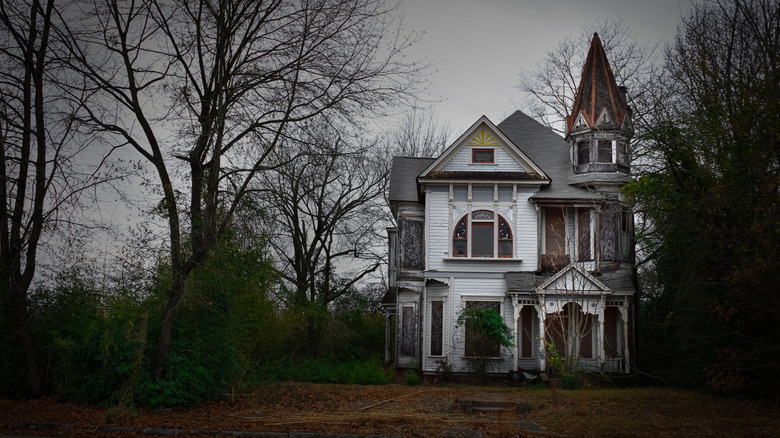Does Your House Have A Hidden Dark Past? Here's How To Find Out
Every house holds secrets. If you've moved into a house that isn't new (especially if it's over 100 years old), perhaps you've felt a strange chill in the hallway or found oddities buried in your backyard. That's the moment your natural curiosity turns into a real question: What unseen history is trapped within these walls? Properties that have stood for decades or even centuries carry stories of the lives, and sometimes the dramatic ends, of all those who lived there before you, which is part of the property information that real estate listing sites can't tell you. Uncovering this history turns a simple residence into a fascinating historical landmark, giving you a deeper, richer connection to your space. After all, every old house has a story to tell, but some are darker than others.
Before you jump headfirst into ghost-hunting gear, however, it is important to temper your expectations of what a "dark past" might actually mean. In most cases, the story you're looking for is far more common and boring than a dramatic Hollywood horror film. Most homes don't have a thrilling history; at worst, someone may have died in the house, or there may have been a painful divorce or a family tragedy. Sometimes something more shocking may pop up, like a violent crime or supposed paranormal activity. These issues can create what is called a "stigmatized property," or a home with a negative perception because of a major traumatic event, and there can be concrete downsides to buying a stigmatized property, such as a lower resale value. Otherwise, knowing this history is really just about filling in the blanks of your home's timeline, no matter how wild (or dull).
How to investigate your home's paper trail for clues
The real work of learning whether your house has a hidden dark past begins at your local county assessor's or recorder's office or the county courthouse, where you can access historical property records. Official documents are the ultimate paper trail, revealing previous owners and the nature of any property transfers, which could include cryptic notations like "estate sales" or "transferred due to demise." Should a particular name, date, or notation raise an eyebrow, cross-reference it with genealogy sites or census records to track families and learn about potentially relevant deaths. You can also unearth death certificates, obituaries, tax records, building permits, or even blueprints at various local offices, such as building departments and Vital Records offices. For very old homes, check if your property is listed on the National Register of Historic Places. While this won't list a crime, it can confirm the historical significance and time period of the home's construction, often linking you to valuable archives with more information.
Next, shift your focus to the public record for any articles about sensational events that involve your home. Use the online archives of local newspapers (often accessible for free with a public library card) and search for combinations of your house number, street name, and keywords like "tragedy," "fire," "death," or "accident." Another effective tactic is to speak to long-time residents or local business owners to see if they have first-hand accounts of events. The final, and perhaps most sensitive, step is looking at criminal records or court dockets, often available through state or county clerks, if your research points toward a crime occurring on your property. This meticulous work allows you to move past suspicion and create an evidence-based narrative for your property's past.

